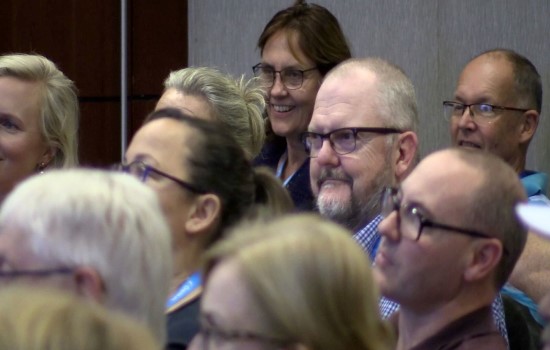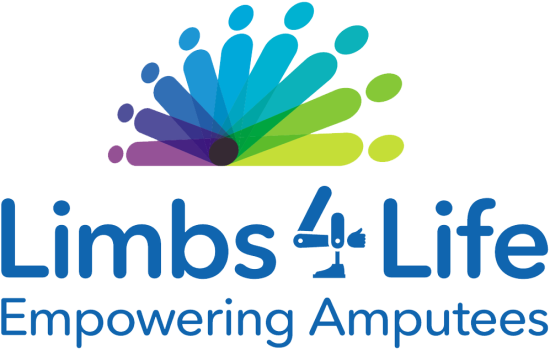Peer support provides profound experience
Garth Johnston has lived a life dedicated to supporting the community, at professional and personal levels. Since becoming an amputee in 2018, Garth has found another community to both support and be supported by. The community of Australian amputees through the Limbs 4 Life Peer Support Program.
Garth spent thirty years in law enforcement, which included roles as a police member, corrections officer, security operative and federal investigator. He relished the public support opportunity that these roles offered.
“I worked in law enforcement in South Australia, Victoria, Northern Territory and Tasmania and enjoyed the challenges that came with roles in different jurisdictions, not to mention the opportunity to serve and protect the public,” Garth said.
Coupled with his volunteering at Burnie’s Men’s Shed and Vinnies, as well as appearing in amateur theatre productions, Garth is a well-known face around his hometown of Penguin in Tasmania.
But what is less known about Garth is that he became a below-knee amputee in 2018 after an accident in 2015 resulted in a 400kg pallet falling on Garth’s feet.
“Initially I didn’t realise how bad the accident was, as I have a high pain threshold and I continued working. A matter of three weeks later I awoke to excruciating pain in my left foot and a foul smell,” Garth said.
It was August 2018, after early onset of gangrene in a left foot toe, when it was discovered that Garth had osteomyelitis and that a below-knee amputation was the only way to stop the spread of the infection.
“Strangely, my amputation surgery took place exactly three years to the day of the initial accident that led to the loss of my leg,” Garth said.

A life-changing introduction
Garth commenced his rehabilitation as soon as possible. He is grateful to the entire team who supported him during his recovery but feels particularly indebted to his prosthetist, Anne-Marie, for two important reasons.
“Not only was she a joy to work with and built my leg, but she also introduced me to Limbs 4 Life and suggested I might want to get in touch for information and support,” Garth said. “I chatted with Melissa and was blown away by her passion to support people like me. We talked about peer support and Melissa arranged for one of their Peer Support Volunteers, Ren Gallet, to give me a call.”
Ren called Garth to see how he was adjusting and give encouragement.
“I immediately felt a connection with Ren as he was so candid, relaxed and helped me to realise I could move forward with my life. It was a really profound experience and I then knew that, life was going to be a bit different but that I could positively adjust to this physical change,” Garth said.
Garth looks forward to becoming a trained Peer Support Volunteer soon to “hopefully offer others the empathy that I received from Ren after my amputation as well as help Limbs 4 Life so that it can continue to play an important role in the lives of Australian amputees for decades to come”.
What is the Peer Support Program?
Limbs 4 Life’s cornerstone program is its National Peer Support Program which sees ‘experienced’, carefully vetted and trained amputees connect with others who have had, or are facing, limb amputation. The service is also provided to parents of children born with a congenital limb difference or who experience amputation during childhood and seek parental peer support. Peer support visits occur in hospital, rehabilitation centres or community settings, as well as over the phone. The program is free and offered across Australia.
Why is peer support beneficial?
Peer Support Program is beneficial for not only the person receiving it, but also for the volunteers providing it.
Benefits of receiving peer support:
- managing fears associated with amputation and limb loss
- coping with feelings of vulnerability and depression
- understanding anxieties associated with body-image and self-esteem
- adapting to a physical disability
- managing short and long-term expectations
- re-engaging with the community.
Benefits of being a Peer Support Volunteer:
- extending personal skills and knowledge
- increased self-confidence
- learning about local communities and healthcare systems
- potential entrée into further education or employment
- feeling ‘good’ about donating time and lived experience with others.
How to access peer support?
Requesting a peer support visit is easy! Visit Limbs-4-Life and submit a request via the website. Or, if you can’t access the internet call on 1300 78 2231.
How to become a Peer Support Volunteer?
Limbs 4 Life enjoys supporting people to achieve their volunteering goals and ambitions. We know that many people with limb loss welcome the opportunity to share their well-earned knowledge and experience with others just commencing on that journey. If becoming a volunteer interests you, feel free to get in touch so we can talk about the program and formal training sessions we run across Australia.
To find out more or submit an online application visit the Limbs4Life Website. and fill out an application.
This is an edited extract of a piece that originally appeared in Amplified, Edition 1 2019. Find the original copy here.

Ready to read more: Try these Inform links:
Werribee Zoo now accessible for all
Six children’s books with positive representations of disability

